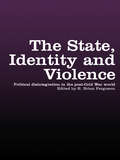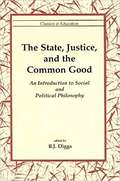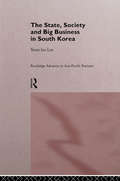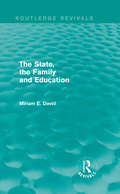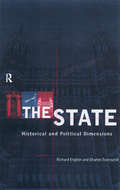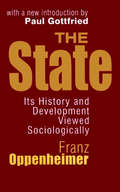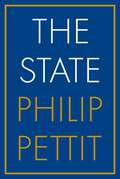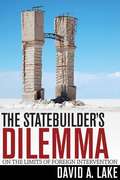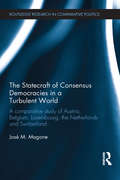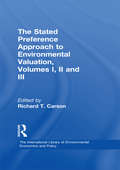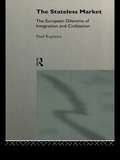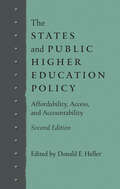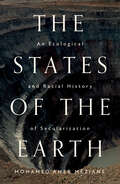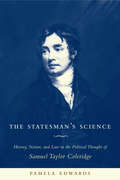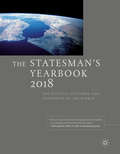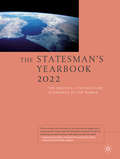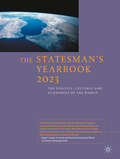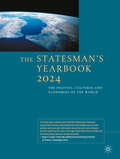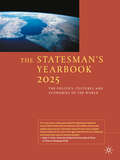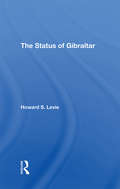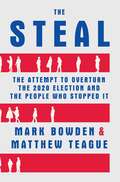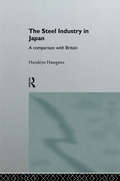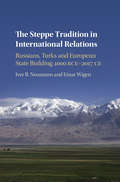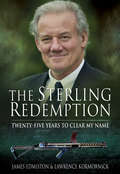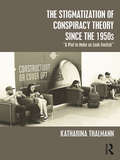- Table View
- List View
The State, Identity and Violence: Political Disintegration in the Post-Cold War World (War And Society Ser.)
by R. Brian FergusonIn this book, a collection of experts investigate the varied forces - from global systems to local beliefs - that lead to civil violence, chaos and, perhaps, a new political order.The State, Identity and Violence explores acts of mass violence occurring within national borders and examines the links such acts have to personal identities and how they challenge the character or very existence of the state. Building upon the anthropological premises of holism and cross-cultural comparison, this volume shows how violent challenges to existing states should be conceptualized as layered problems, with multiple kinds of causes. It not only goes beyond the "ancient hatreds" explanation, but shows the inadequacy of the concept of "ethnic violence" and of theories which treat interests and identities as separate, sometimes opposed variables
The State, Justice, and the Common Good: An Introduction to Social and Political Philosophy
by B. J. DiggsThe State, Justice, and the Common Good An Introduction to Social and Political Philosophy
The State, Society and Big Business in South Korea (Routledge Advances in Asia-Pacific Business)
by Yeon-Ho LeeThis book examines how the South Korean state is able to execute national policies that are opposed to the interests of social constituents, despite the expansion of social power. The relationship between the government and big business provides an illuminating example of this. The author demonstrates how Confucian values, the role of the family and a firm hierarchical tradition have prevented South Korea from developing a modern state on the Western model.
The State, the Family and Education (Routledge Revivals)
by Miriam DavidIn The State, The Family and Education, first published in 1980, Miriam David provides an entirely new analysis of the relationship of the State to the family and education. David shows how the State, through its educational policies, regulates family relationships with, and within, schools. This book provides a welcome analysis of educational policy from a socialist-feminist perspective, re-examining the ways in which women as parents, teachers and pupils are involved in the education system. This book will be of interests to students of education.
The State: Historical And Political Dimensions
by Charles Townshend Richard EnglishDrawing on current debates on secessions within the United Kingdom, this book analyses the British State today and looks at its place in the future. Featuring original contributions from a variety of disciplines, this study tackles the problem of defining and studying the state and looks at the role the nation-state has played as the basic political unit in Europe and throughout the world.
The State: Its History and Development Viewed Sociologically
by Franz OppenheimerThe State represents the epitome of Franz Oppenheimer's thinking. It integrates political and historical philosophy on the one hand, with economic philosophy on the other. Oppenheimer believed the future progress of nations would be in the direction of liberal socialism. He foresaw a society free from all monopolistic tendencies through unfettered competition.According to Oppenheimer, competition is restrained by a powerful class monopoly, created not through economic differentiation, but through political power. This class monopoly stands between the masses and the land. The laboring class is subject to the will of the upper classes because it does not control the means of production necessary to work in its own interest. Oppenheimer asserts that the right to hold more land than one can properly work through his own efforts and the efforts of his family cannot exist without political control, and is the single most important explanation for the formation of monopolies in human society. He proves his theory in an original analysis.Paul Gottfried writes in the new introduction that The State sums up and illustrates Oppenheimer's general theory of the origin, development, and expected transformation of the state, central political institution of the modern world. Much of Oppenheimer's work embodies the same independent spirit reflected in his way of life. The State provides a wealth of information for economists, political theorists, and sociologists.Franz Oppenheimer was professor of economics and sociology at the University of Frankfurt in Germany until he retired in 1929. In 1933 he was forced to flee the Nazi regime and eventually came to the United States, where he died in 1943.Paul Gottfried is professor of political science at Elizabethtown College in Pennsylvania. He is the author of The Search for Historical Meaning; Carl Schmitt: Politics and Theory; Conservative Millenarians: The Romantic Experience in Bavaria; and After Liberalism (forthcoming from Princeton University Press). He is general editor of Religion and Public Life.
The State: Normative Analysis Of The State
by Philip PettitA major new account of the state and its importance by a leading political philosopherThe future of our species depends on the state. Can states resist corporate capture, religious zealotry, and nationalist mania? Can they find a way to work together so that the earth heals and its peoples prosper? Or is the state just not up to the task? In this book, the prominent political philosopher Philip Pettit examines the nature of the state and its capacity to serve goals like peace and justice within and beyond its borders. In doing so, he breaks new ground by making the state the focus of political theory—with implications for economic, legal, and social theory—and presents a persuasive, historically informed image of an institution that lies at the center of our lives.Offering an account that is more realist than utopian, Pettit starts from the function the polity is meant to serve, looks at how it can best discharge that function, and explores its ability to engage beneficially in the life of its citizens. This enables him to identify an ideal of statehood that is a precondition of justice. Only if states approximate this functional ideal will they be able to deal with the perennial problems of extreme poverty and bitter discord as well as the challenges that loom over the coming centuries, including climate change, population growth, and nuclear arms.
The Statebuilder's Dilemma: On the Limits of Foreign Intervention
by David A. LakeThe central task of all statebuilding is to create a state that is regarded as legitimate by the people over whom it exercises authority. This is a necessary condition for stable, effective governance. States sufficiently motivated to bear the costs of building a state in some distant land are likely to have interests in the future policies of that country, and will therefore seek to promote loyal leaders who are sympathetic to their interests and willing to implement their preferred policies. In The Statebuilder's Dilemma, David A. Lake addresses the key tradeoff between legitimacy and loyalty common to all international statebuilding attempts. Except in rare cases where the policy preferences of the statebuilder and the population of the country whose state is to be built coincide, as in the famous success cases of West Germany and Japan after 1945, promoting a leader who will remain loyal to the statebuilder undermines that leader's legitimacy at home. In Iraq, thrust into a statebuilding role it neither anticipated nor wanted, the United States eventually backed Nouri al-Malaki as the most favorable of a bad lot of alternative leaders. Malaki then used the support of the Bush administration to govern as a Shiite partisan, undermining the statebuilding effort and ultimately leading to the second failure of the Iraqi state in 2014. Ethiopia faced the same tradeoff in Somalia after the rise of a promising but irredentist government in 2006, invading to put its own puppet in power in Mogadishu. But the resulting government has not been able to build significant local support and legitimacy. Lake uses these cases to demonstrate that the greater the interests of the statebuilder in the target country, the more difficult it is to build a legitimate state that can survive on its own.
The Statecraft of Consensus Democracies in a Turbulent World: A Comparative Study of Austria, Belgium, Luxembourg, the Netherlands and Switzerland (Routledge Research in Comparative Politics)
by José M. MagoneDrawing on the work of Arend Lijphart, this book focuses on consensus democracies. These democracies entail a complex set of democratic institutional and conventional arrangements and can be regarded as a product of path-dependent development towards a national culture of compromise and bargaining. Taking a multi-dimensional and multi-spatial approach, this book examines the West central European consensus democracies of Austria, Belgium, Luxembourg, Netherlands and Switzerland, over the past 40 years. Magone examines how these democracies have been transformed by Europeanization thrusts and global turbulence yet are able to maintain political stability. It provides historical context including the different phases of transformation: the golden period (1945-1979); disorganised capitalism (1979-1993); and re-equilibration (1993-). It includes chapters on political culture, government, parliament, the rise of populism and political parties, subnational government, and the political economy and concludes deliberating on the relevance of consensus democracies’ experiences for the future of European and global governance. Based on original research, this book will be of strong interest to students and scholars of comparative politics, European government, West European politics, the politics of small states in Europe, and those with a particular interest in the politics of Austria, Belgium, the Netherlands, Luxembourg and Switzerland.
The Stated Preference Approach to Environmental Valuation, Volumes I, II and III: Volume I: Foundations, Initial Development, Statistical Approaches Volume II:Conceptual and Empirical Issues Volume III: Applications: Benefit-Cost Analysis and Natural Resource Damage Assessment (The International Library of Environmental Economics and Policy)
by Richard T. CarsonThere is a truly enormous literature on using stated preference information to place a monetary value on environmental amenities. This three volume set provides the key papers for understanding the historical development of contingent valuation, its theoretical and statistical foundations, and the major controversies. It also contains representative papers covering all of the major application areas in environmental valuation.
The Stateless Market: The European Dilemma of Integration and Civilization
by Paul KapteynThis book offers a broad view of the tension between state and market in the political evolution of the European Union.Contemporary developments and issues are set within the historical context of state formation. Paul Kapteyn argues that states are invariably formed by violent conquest, or by fusion in the face of an external threat; and that markets can emerge only only when the state has been established. He points out that while the histories of France, Britain, The Netherlands and Germany conform to these rules, the European Union does not; and he goes on to explore the reasons why this is not so, and its implications. The second section of the book is based on empirical research. Paul Kapteyn underpins his theoretical and historical argument with an analysis of official documents, newspaper articles and interviews with Eurocrats form the various member states. He concentrates especially on two case studies, of the Treaty of Schengen on judicial cooperation and harmonization, and of the problem of EU fraud. He also looks closely at eh consquences of the Maastricht Treaty.The Stateless Marlet is a thought-provoking text, ideally suited to students on European studies, politics, international relations and sociology courses. it will also be of great interest to those professionally concerned with European integration.
The States and Public Higher Education Policy: Affordability, Access, and Accountability
by Donald E. HellerAffordability, access, and accountability have long been among the central challenges facing higher education—and they remain so today. Here, Donald E. Heller and other higher education scholars and practitioners explore the current debates surrounding these key issues. As students and their families struggle to meet rising tuition prices, and as state funding for higher education dwindles, policymakers confront issues of affordability within state and institutional budgets. Changing demographics and challenges to affirmative action complicate the admissions process even as colleges and universities seek to diversify enrollments. And issues of institutional accountability have forced the restructuring of higher education governing boards and a reexamination of the role of public trustees in governance.This collection analyzes how issues of affordability, access, and accountability influence the way in which state governments approach, monitor, and set public higher education policy. The contributors examine the latest research on pressing challenges, explore how states are coping with these challenges, and consider what the future holds for public postsecondary education in the United States.
The States of the Earth: An Ecological and Racial History of Secularization
by Mohamed Amer Meziane"An extraordinary book. Mohamed Amer Meziane's breathtaking analysis of the making of fossil states opens to a new genre of history writing where the very layers of earth's riches are at its center."—Ann Laura Stoler, author of Carnal Knowledge and Imperial Power, Along the Archival GrainHow the disenchantment of empire led to climate changeWhile industrial states competed to colonize Asia and Africa in the nineteenth century, conversion to Christianity was replaced by a civilizing mission. This new secular impetus strode hand in hand with racial capitalism in the age of empires: a terrestrial paradise was to be achieved through accumulation and the ravaging of nature.Far from a defence of religion, The States of the Earth argues that phenomena such as evangelism and political Islam are best understood as products of empire and secularization. In a world where material technology was considered divine, religious and secular forces both tried to achieve Heaven on Earth by destroying Earth itself.
The Statesman's Science: History, Nature, and Law in the Political Thought of Samuel Taylor Coleridge
by Pamela EdwardsAuthor of "Kubla Khan" and the epic "The Rime of the Ancient Mariner," Samuel Taylor Coleridge is remembered principally for his contributions as a romantic poet. This innovative reconsideration of Coleridge's thought and career not only demonstrates his importance as a philosopher but also recovers romanticism as both an aesthetic and a political movement. Pamela Edwards radically departs from classic theories of Coleridge's development and reads his writing within the framework of a constantly shifting political and social landscape. Drawing on the ideology, rhetoric, and institutional theory at the turn of the late British Enlightenment, Edwards unearths the fundamental continuities in Coleridge's writing during the revolutionary period of 1794 to 1834, paying particular attention to the rhetoric of Coleridge's pamphlet and miscellaneous writings, the journalism of the Napoleonic years, his philosophical and ultimately political treatises within the contexts of his notebooks and letters, and his readings and intellectual friendships. What emerges is a clearer understanding of Coleridge's political philosophy and his contributions to the origins and ideology of British Liberalism. Coleridge's interest in history, nature, and law as inherently interconnected projects producing an ideal or scientific reading of society reveals a developed progressive social and cultural state theory anchored in individual conscience, moral autonomy, and a civic and participatory human agency. If the Statesman could understand and finally master this scientific view of the world, he would be able not only to adjust political and social institutions to comprehend the historical contingencies of the moment but to see through the problem of the moment to the dynamic of change itself.
The Statesman's Yearbook 2018
by Palgrave MacmillanNow in its 154th edition, The Statesman's Yearbook continues to be the reference work of choice for accurate and reliable information on every country in the world. Covering political, economic, social and cultural aspects, the Yearbook is also available online for subscribing institutions: www.statesmansyearbook.com
The Statesman's Yearbook 2022: The Politics, Cultures and Economies of the World (The Statesman's Yearbook)
by Springer Nature Limited Published annually since 1864Now in its 158th edition, The Statesman's Yearbook continues to be the reference work of choice for accurate and reliable information on every country in the world. Covering political, economic, social and cultural aspects, the Yearbook is also available online for subscribing institutions.
The Statesman's Yearbook 2023: The Politics, Cultures and Economies of the World (The Statesman's Yearbook)
by Springer Nature Limited Published annually since 1864Now in its 159th edition, The Statesman's Yearbook continues to be the reference work of choice for accurate and reliable information on every country in the world. Covering political, economic, social and cultural aspects, the Yearbook is also available online for subscribing institutions.
The Statesman's Yearbook 2024: The Politics, Cultures and Economies of the World (The Statesman's Yearbook)
by Springer Nature Limited Published annually since 1864Now in its 159th edition, The Statesman's Yearbook continues to be the reference work of choice for accurate and reliable information on every country in the world. Covering political, economic, social and cultural aspects, the Yearbook is also available online for subscribing institutions.
The Statesman's Yearbook 2025: The Politics, Cultures and Economies of the World (The Statesman's Yearbook)
by Springer Nature Limited Published annually since 1864Now in its 61st edition, The Statesman's Yearbook continues to be the reference work of choice for accurate and reliable information on every country in the world. Covering political, economic, social and cultural aspects, the Yearbook is also available online for subscribing institutions.
The Status Of Gibraltar
by Howard S LevieTwo aphorisms are often stated about Gibraltar: first, that it was a possession that "Spain did not value until she had lost it"; and second, since the day it became a British possession, "Gibraltar has been a thorn in the side of Spain." Except for a few relatively short periods, the Gibraltar issue has adversely affected Anglo-Spanish relations during the almost 275 years of British ownership. To date, negotiations under the aegis of the United Nations have proven unfruitful. Spain demands that complete sovereignty be returned. Great Britain declines to take any such action without the consent of the inhabitants. Despite a referendum in which the Gibraltarians voted overwhelmingly to retain links with Great Britain, the Special Committee of the U.N. General Assembly continues to strongly support the Spanish claim. What effect Spain's entry into NATO will have remains to be seen. This book examines the historical background and present status of the dispute, making extensive use of documents not previously analyzed in depth. Dr. Levie describes the events leading up to the Treaty of Utrecht, provides a detailed analysis of the treaty itself, and traces the origins of its various interpretations. He discusses how the British, unintentionally or otherwise, have violated its provisions, and how the Spanish have attempted to retaliate. The book concludes with a discussion of how the Gibraltar issue has beeen handled in the U.N. to the present day.
The Steal: The Attempt to Overturn the 2020 Election and the People Who Stopped It
by Mark Bowden Matthew Teague“A gripping ground-level narrative…a marvel of reporting: tightly wound… but also panoramic.”—Washington Post <p><p> “A lean, fast-paced and important account of the chaotic final weeks.”—New York Times <p><p> In The Steal, veteran journalists Mark Bowden and Matthew Teague offer a week-by-week, state-by-state account of the effort to overturn the 2020 presidential election. <p><p> In the sixty-four days between November 3 and January 6, President Donald Trump and his allies fought to reverse the outcome of the vote. Focusing on six states—Arizona, Georgia, Michigan, Nevada, Pennsylvania, and Wisconsin—Trump’s supporters claimed widespread voter fraud. <p><p> Caught up in this effort were scores of activists, lawyers, judges, and state and local officials. Working with a team of researchers and reporters, Bowden and Teague uncover never-before-told accounts from the election officials fighting to do their jobs amid outlandish claims and threats to themselves, their colleagues, and their families. The Steal is an engaging, in-depth report on what happened during those crucial nine weeks and a portrait of the dedicated individuals who did their duty and stood firm against the unprecedented, sustained attack on our election system and ensured that every legal vote was counted and that the will of the people prevailed.
The Steel Industry in Japan: A Comparison with Britain (The University of Sheffield/Routledge Japanese Studies Series)
by Harukiyo HasegawaFirst published in 2004. Routledge is an imprint of Taylor & Francis, an informa company.
The Steppe Tradition in International Relations: Russians, Turks and European State Building 4000 BCE–2017 CE
by Iver B. Neumann Einar WigenNeumann and Wigen counter Euro-centrism in the study of international relations by providing a full account of political organisation in the Eurasian steppe from the fourth millennium BCE up until the present day. Drawing on a wide range of archaeological and historical secondary sources, alongside social theory, they discuss the pre-history, history and effect of what they name the 'steppe tradition'. Writing from an International Relations perspective, the authors give a full treatment of the steppe tradition's role in early European state formation, as well as explaining how politics in states like Turkey and Russia can be understood as hybridising the steppe tradition with an increasingly dominant European tradition. They show how the steppe tradition's ideas of political leadership, legitimacy and concepts of succession politics can help us to understand the policies and behaviour of such leaders as Putin in Russia and Erdogan in Turkey.
The Sterling Redemption: Twenty-Five Years to Clear My Name
by James Edmiston Lawrence KormornickThe fight against a false accusation in the Arms-to-Iraq affair. &“A searing expose of one of the most shameful and cynical prosecutions of modern times.&” —The Guardian This is the untold true story of James Edmiston who suffered an extraordinary miscarriage of justice in 1983 when senior officials blocked vital witnesses coming to his trial which led to a personal tragedy; a broken marriage, and the loss of a business. The book explains how he was wrongly charged with alleged illegal exports to Iraq, and then took on the establishment against seemingly impossible odds for twenty-five years, to establish his innocence and to win record compensation from the British government in a truly remarkable case. Divorced and bankrupted, he is now rebuilding a shattered life, nearly thirty years later. This extraordinary story is a fascinating insight into government and the abuse of power and is based on many original sources including the Scott Report and Judgment of the Court of Appeal (criminal). The co-author, Lawrence Kormornick, is a Solicitor-Advocate (civil) who has represented Edmiston and several other victims of the Arms-to-Iraq prosecution scandal against the government and has a unique insight into these cases. Packed with ironies, twists of fate, and many unanswered questions it is a compelling read for anyone interested in political intrigue and abuse of power, miscarriage of justice, and learning about how an individual took on the state and won. &“A true story of alleged skulduggery and, possibly, criminal acts in the form of perverting the course of justice by the authorities and it should be bedside reading for everybody who believes in the rule of law.&” —The Law Society Gazette
The Stigmatization of Conspiracy Theory since the 1950s: "A Plot to Make us Look Foolish" (Conspiracy Theories)
by Katharina ThalmannAre conspiracy theories everywhere and is everyone a conspiracy theorist? This ground-breaking study challenges some of the widely shared assessments in the scholarship about a perceived mainstreaming of conspiracy theory. It claims that conspiracy theory underwent a significant shift in status in the mid-20th century and has since then become highly visible as an object of concern in public debates. Providing an in-depth analysis of academic and media discourses, Katharina Thalmann is the first scholar to systematically trace the history and process of the delegitimization of conspiracy theory. By reading a wide range of conspiracist accounts about three central events in American history from the 1950s to 1970s – the Great Red Scare, the Kennedy assassination, and the Watergate scandal – Thalmann shows that a veritable conspiracist subculture emerged in the 1970s as conspiracy theories were pushed out of the legitimate marketplace of ideas and conspiracy theory became a commodity not unlike pornography: alluring in its illegitimacy, commonsensical, and highly profitable. This will be of interest to scholars and researchers interested in American history, culture and subcultures, as well, of course, to those fascinated by conspiracies.
